15-16学年译林牛津版高二(上)课件:模块五 Unit 1 Getting along with others Grammar and usage(共77张PPT)
文档属性
| 名称 | 15-16学年译林牛津版高二(上)课件:模块五 Unit 1 Getting along with others Grammar and usage(共77张PPT) |

|
|
| 格式 | zip | ||
| 文件大小 | 3.1MB | ||
| 资源类型 | 教案 | ||
| 版本资源 | 牛津译林版 | ||
| 科目 | 英语 | ||
| 更新时间 | 2015-08-19 00:00:00 | ||
图片预览

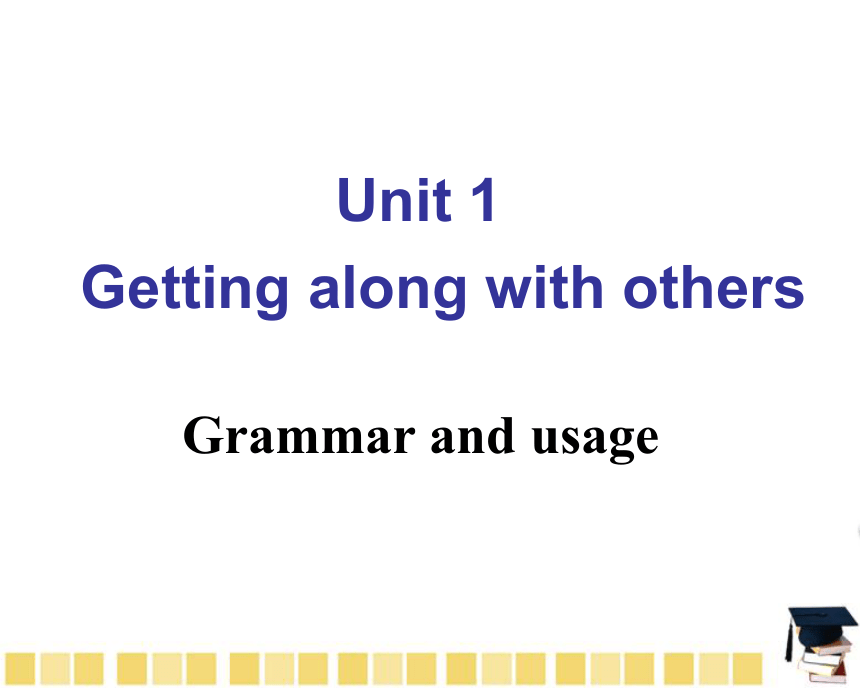
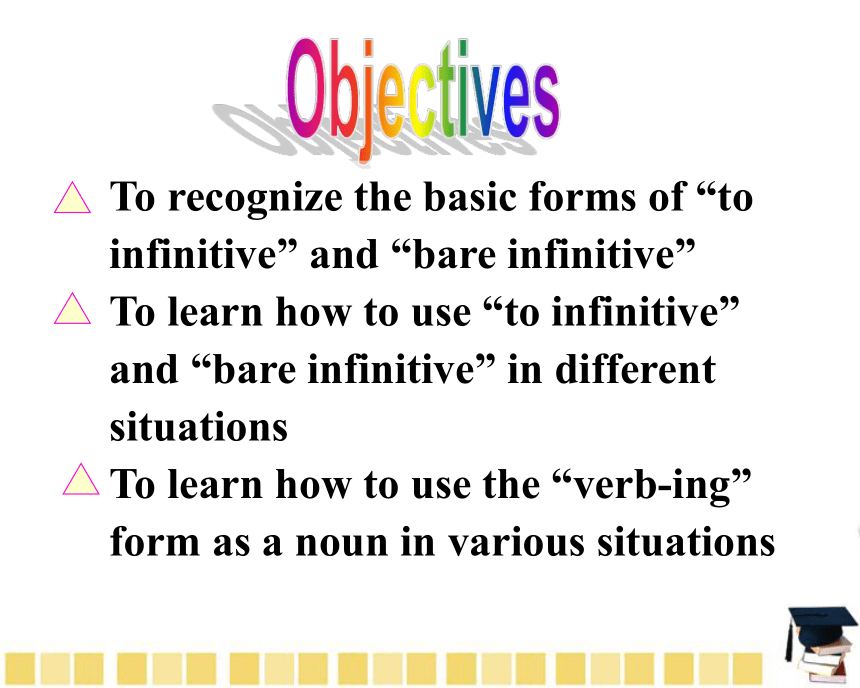
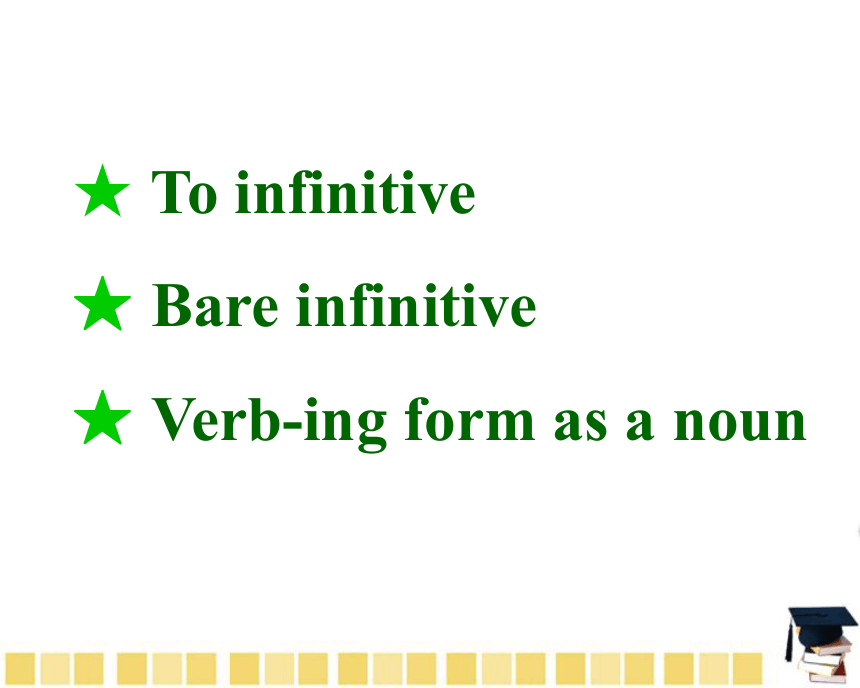

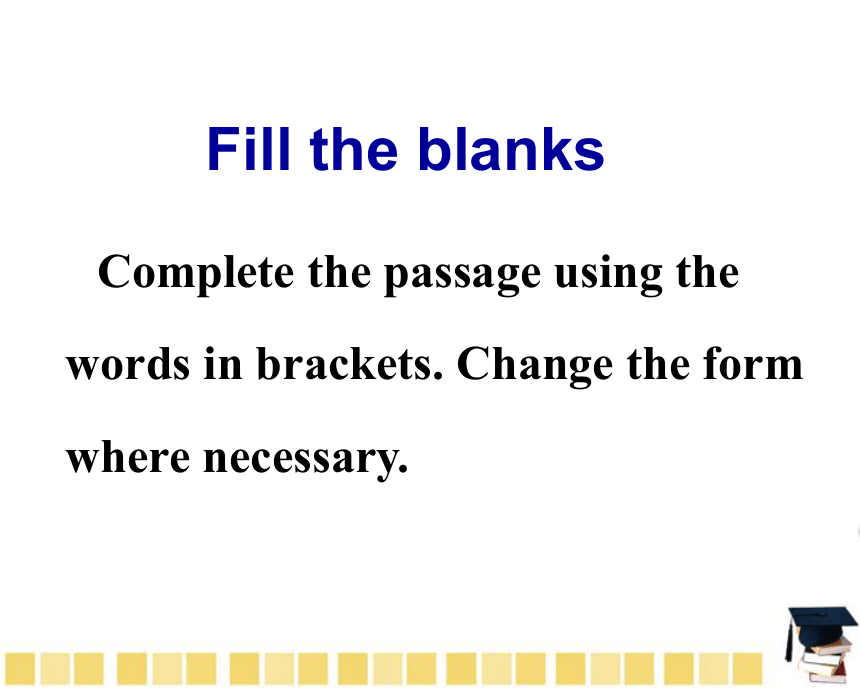
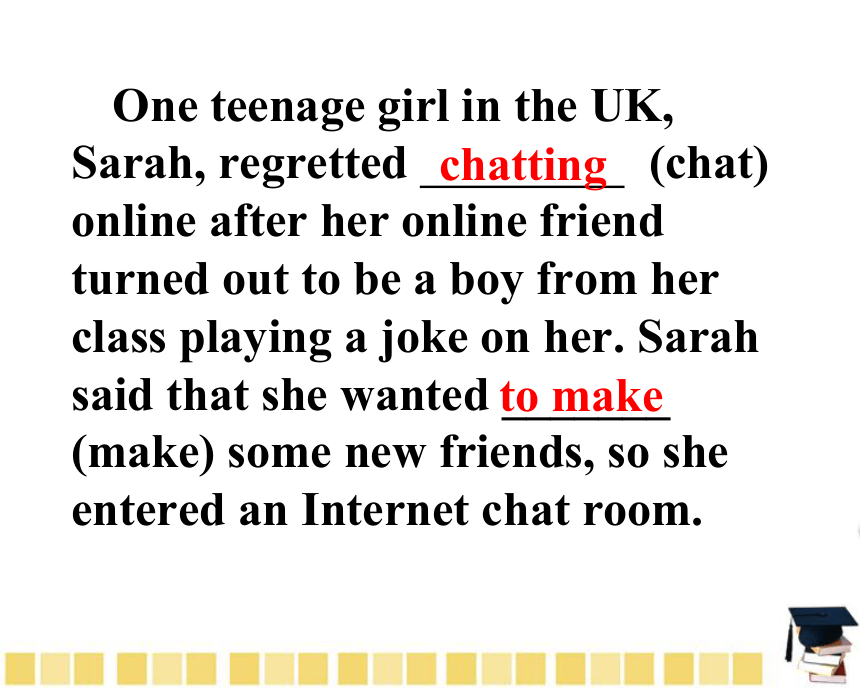
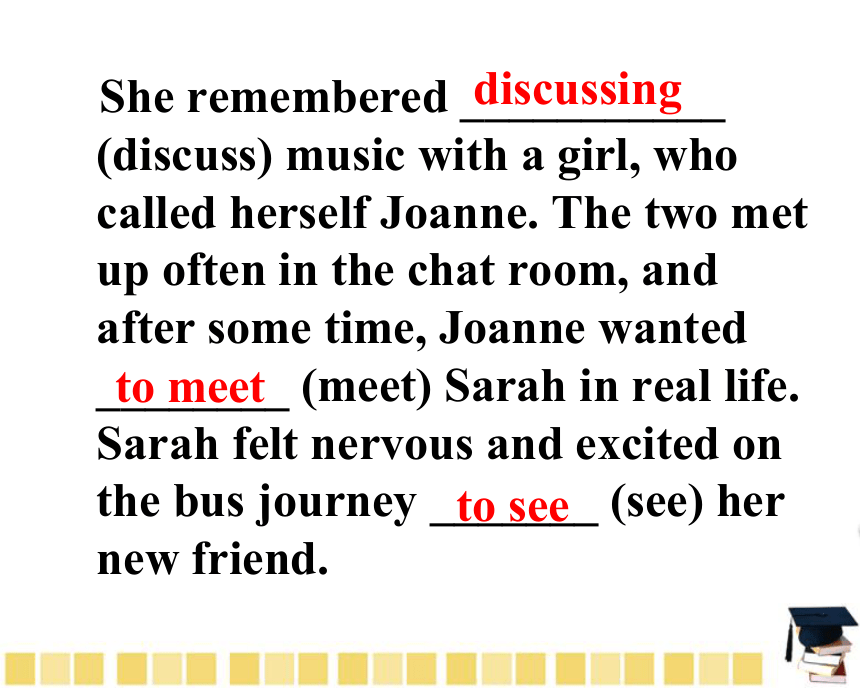
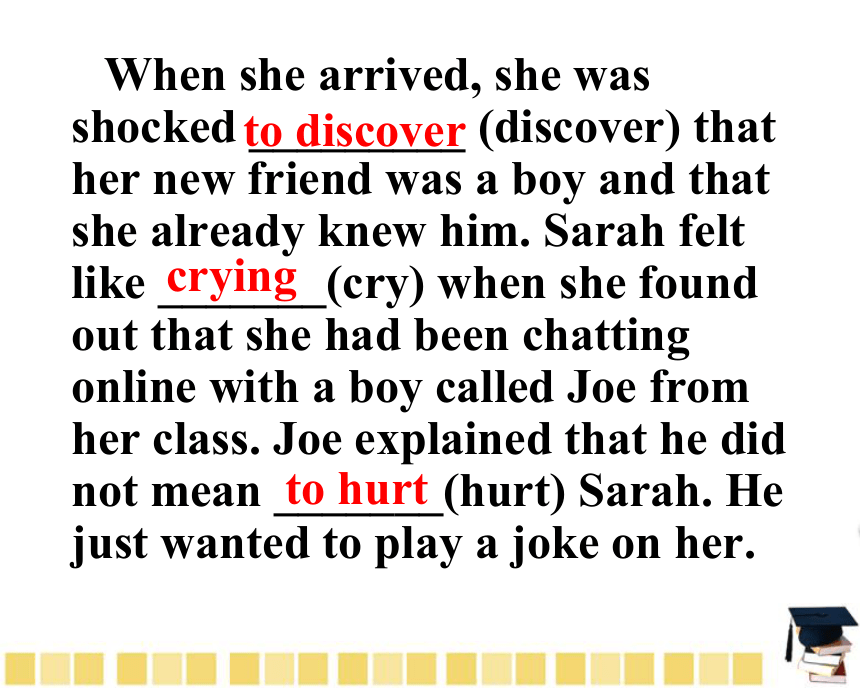
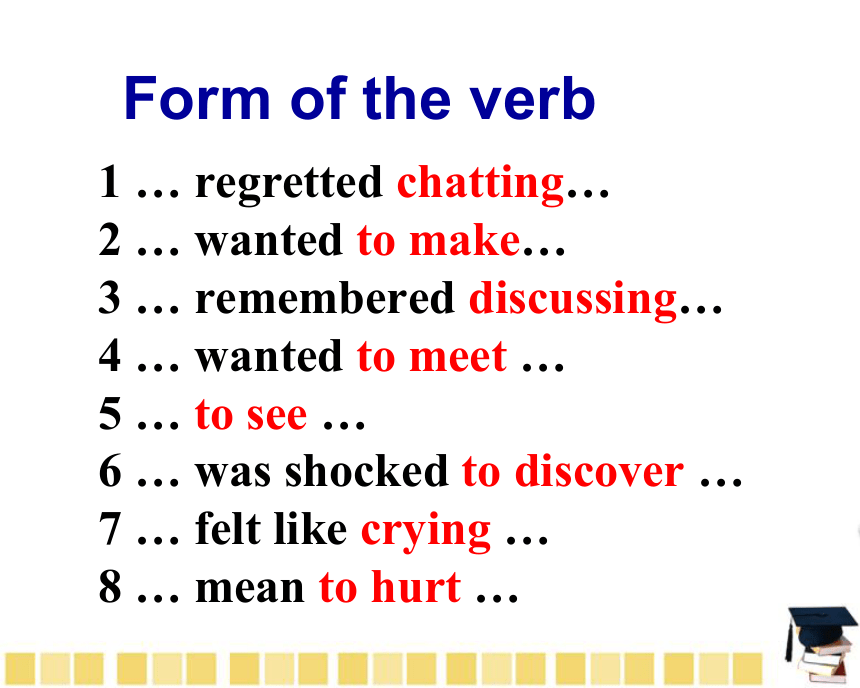
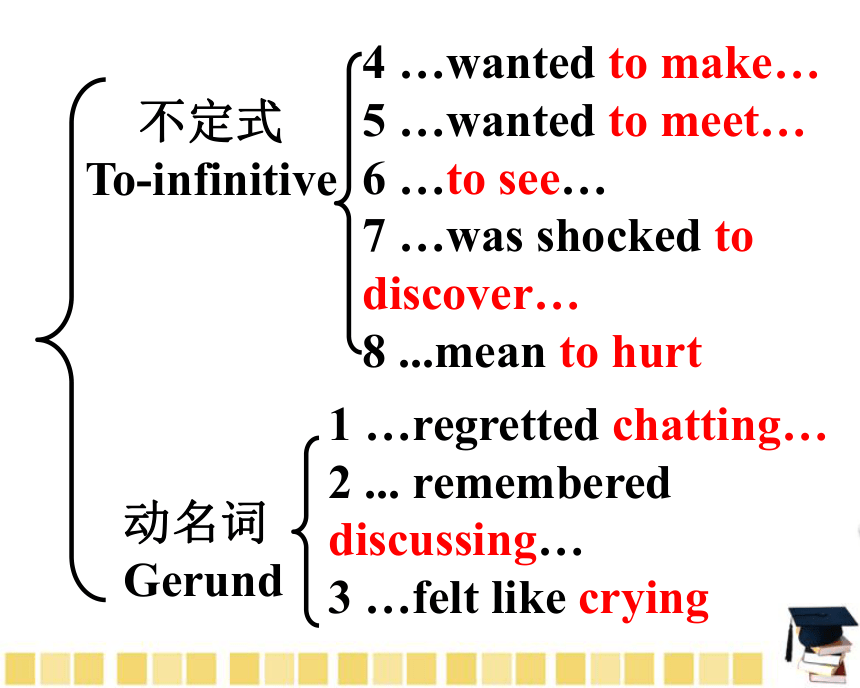
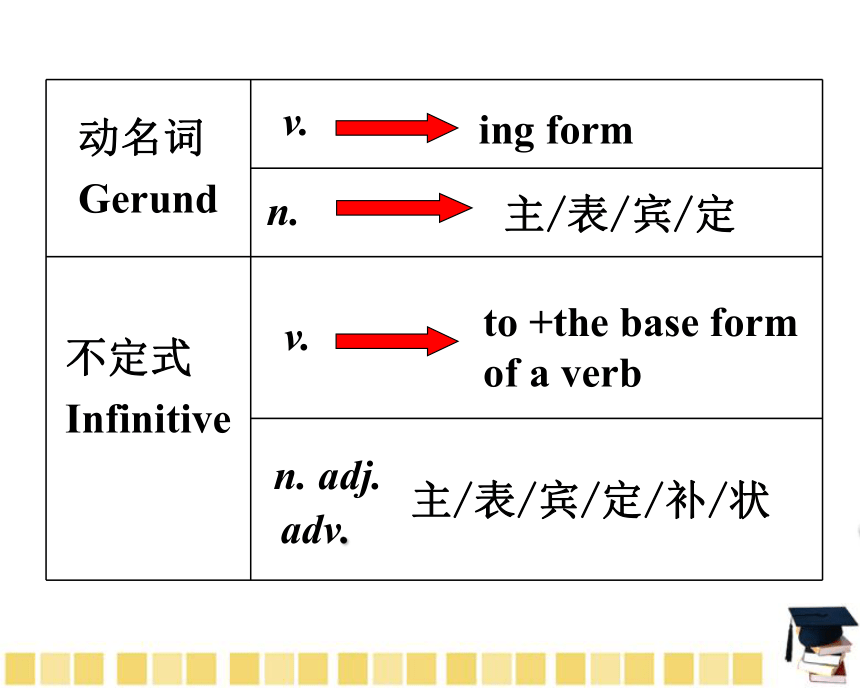
文档简介
课件77张PPT。Grammar and usageUnit 1
Getting along with othersObjectivesTo recognize the basic forms of “to infinitive” and “bare infinitive”
To learn how to use “to infinitive” and “bare infinitive” in different situations
To learn how to use the “verb-ing” form as a noun in various situations ★ To infinitive
★ Bare infinitive
★ Verb-ing form as a noun To make friends, which way of communication do you prefer, chatting online or talking face to face? Why? Free talk Fill the blanks Complete the passage using the words in brackets. Change the form where necessary. One teenage girl in the UK, Sarah, regretted (chat) online after her online friend turned out to be a boy from her class playing a joke on her. Sarah said that she wanted _______ (make) some new friends, so she entered an Internet chat room. chattingto make She remembered ___________ (discuss) music with a girl, who called herself Joanne. The two met up often in the chat room, and after some time, Joanne wanted ________ (meet) Sarah in real life. Sarah felt nervous and excited on the bus journey _______ (see) her new friend. discussingto meetto see When she arrived, she was shocked _________ (discover) that her new friend was a boy and that she already knew him. Sarah felt like _______(cry) when she found out that she had been chatting online with a boy called Joe from her class. Joe explained that he did not mean _______(hurt) Sarah. He just wanted to play a joke on her.to discovercryingto hurt1 … regretted chatting…
2 … wanted to make…
3 … remembered discussing…
4 … wanted to meet …
5 … to see …
6 … was shocked to discover …
7 … felt like crying …
8 … mean to hurt … Form of the verb 不定式
To-infinitive动名词
Gerund1 …regretted chatting…
2 ... remembered discussing…
3 …felt like crying4 …wanted to make…
5 …wanted to meet…
6 …to see…
7 …was shocked to discover…
8 ...mean to hurtv. ing form主/表/宾/定/补/状v. to +the base form of a verb不定式和动名词的
时态和语态语态时态不定式的时态和语态He pretended to be working hard when his boss passed him. I’m sorry to have kept you waiting.老板经过他时,他假装正在卖力的工作。对不起让你久等了。语态时态动名词的时态和语态doinghaving donebeing donehaving been doneThank you for having helped me so much.Before being used, the machine must be checked.感谢你帮我这么多忙。在使用之前该药物必须要被检验。不定式是非谓语动词常见的一种形式,通常由“to + 动词原形” 构成,其否定形式为“not to + 动词原形” ,在句中可以做主语、宾语、宾语(主语)补足语、定语、表语或状语等。To infinitive (动词)不定式1. ‘to infinitive’ used as the subject
不定式(短语)作主语
eg. To obey law is everyone's duty.
遵纪守法是每个人的职责。
To see is to believe.
眼见为实。
To talk with your mouth full is rude.
满嘴食物地讲话是不礼貌的。Notes It is impossible to finish the work in
such a short time.
在如此短的时间内完成这项工作是不
可能的。
It is useful for you to learn some
spoken English.
学习一些口语对你来说是有用的。 2. ‘to infinitive’ used as the object
不定式(短语)作宾语
eg. He managed to solve the problem
by himself.
他自己设法解决了问题。
I like to read newspaper articles
about sports.
我喜欢读一些体育方面的新闻报道。
Amy wants to know more about the
film.
安米想知道更多的关于这部电影的情
况。want, hope, wish, like, begin, start, agree, learn, mean, teach, refuse, help, arrange, dare, decide, determine, fail, manage, offer, prepare, pretend, continue, ask,
promise, expect, choose, preferThe following words are usually followed by ‘to infinitive’ as the object:3. ‘to infinitive’ used as the object
complement
不定式(短语)作宾语补足语
eg. I'd like you to keep everything tidy.
我希望你能使每样东西都保持整洁。
The teacher asked us to finish the work
today.
老师要我们今天完成工作。
Tell Jack to close the window, please.
请让杰克关上窗户。动词make, let, have, hear, see, feel, watch, notice 和observe后的宾语补足语,要省去"to"。
eg. They saw the boy fall suddenly
from the tree.
他们看见那小男孩突然从树上跌下来。
The boss made the workers work
14 hours a day.
老板让工人们每天工作14小时。4. “to infinitive” used as the attributive
不定式(短语)作定语
eg. I have a lot of work to do.
我有许多工作要做。
I have no one to talk to.
我没有一个可以交谈的人。
He is looking for a house to live in.
他正在找房子住。5. ‘to infinitive’ used as the predicative
不定式(短语)作表语
eg. My wish is to be a doctor.
我的愿望是成为一名医生。
Our plan is to finish the work in two
weeks.
我们的计划是两周内完成这项工作。
What I need most now is to have a
good rest.
我现在最需要的是好好休息。 6. ‘to infinitive’ used as the adverbial of a
sentence to show reason, purpose or result
不定式(短语)作句子状语
eg. He came here to attend an important
meeting. (purpose)
他来这儿参加一个重要的会议。(目的)
Sam was very surprised to hear the news.
(reason)
萨姆听到这个消息很吃惊。(原因)
He went home to find his old friend
George waiting for him. (result)
他到家发现他的老朋友乔治在等他。(结果)When we use “to infinitive” as the result adverbial, it means the result is unexpected or surprising.
eg. He hurried to the rail station,
only to find the train had left.7. the continuous and perfect forms of ‘to
infinitive’
不定式的进行式和完成式
eg. She seemed to have heard of it already.
她似乎已经听说过这件事了。
When the teacher came in, the
students pretended to be reading
loudly.
当老师进来时,同学们假装正在大声
读书。make, have, let
watch, hear,
feel, see, notice
would rather,
had better,
why notsb.
do
+1. we use the bare infinitive after: +Bare infinitive (省略to的不定式)sb. beseen
watched
looked at
heard
listened to
felt
noticed+to do 主动变被动,to 要还原 2. When two infinitives are joined by and, or, except, but, than, rather than, we normally use the bare infinitive for the second infinitive.
She told me to be cheerful and look on the bright side.
We had nothing to do but watch TV. 3. Verbs of perception can also be used with doing (sth.) but with different meanings.I saw her talk to her new friends.
我看到她和她的新朋友谈话。
(我目睹了整个谈话过程。)
I saw her talking to her new friends.
我看到她正在和她的新朋友谈话。
(当我看到的时候,她正在谈话。但我
可能没看到整个过程。)Verb-ing form as a noun 1.Verb-ing form used as the subject of a sentence
eg. Laying eggs is the ant queen's full-time
job. 产卵是蚁后的专职工作。
It is no use arguing with him.
与他争辩没用。
Her swimming has improved since she
started training every day. 自从她开始
训练以后,她的游泳进步的很快。
2.Verb-ing form used as the object of a sentence
eg. I like swimming.
我喜欢游泳。
He has finished writing the composition.
他已经写好了作文。
He loves playing football.
他喜欢踢足球。admit, dislike, imagine,
delay, consider, mind, suggest, avoid, enjoy,
practise, finish, miss,
keep, understand…We use a verb-ing form after these
verbs: The following phrases are followed by the verb-ing form: would you mind,
look forward to,
can't stand,
put off,
give up,
stick to,
be worth, can't help,
feel like,
It's no use / good...,
keep on,
devote to,
be busy,
get down to… regret to do: 抱歉要做某事
regret doing: 后悔做了某事
eg. I regret to tell you that you are fired.
我抱歉地告诉你你被解雇了。
I regret telling him the truth.
我后悔告诉他真相。 3. Some verbs can be followed by a verb-ing form or ‘to infinitive’, but with some differences in meanings or usage. forget to do: 忘记去做某事
forget doing: 忘记做了某事
eg. He forgot to close the door
when he left.
他离开时忘了关门了。
I will never forget winning my
first gold medal.
我永远忘不了我第一次获得金牌
的情况。 remember to do: 记得要做某事
remember doing: 记得曾经做过的事
eg. Remember to post the letter for
me on your way to work, OK?
在你上班的路上记得帮我把信寄了,
好吗?
I remember seeing this man
somewhere.
我记得在哪儿见过这个人。 mean to do: 打算做某事
mean doing: 意味着做某事
eg. I mean to come earlier today.
我今天打算早点来。
Missing this train means waiting
for another hour.
错过这列火车意味着又要等一个
小时。 try to do: 努力做某事
try doing: 尝试做某事
eg. She tried to finish the work as
quickly as she could.
她努力地要尽快完成这项工作。
I tried doing the exercise in a
different way.
我尝试用另一种方法解题。 stop to do: 停下来做某事
stop doing: 停止做某事
eg. The workers stopped to have
a rest.
工人们停下来休息。
The workers stopped working
and took a rest.
工人们停止了手中的活,休息一
下。
go on to do: 继续做另一件事
go on doing: 继续做同一件事
eg. After doing the cooking, mother
went on to do some washing.
饭做好后,妈妈又继续洗衣服了。
The workers went on working after
a short rest.
短暂的休息后,工人们又开始干活
了。(sb.)like
love
hate
prefer
begin
start
continue+to do or
doing 4. We can use a verb ‘-ing’ form or an infinitive after the following verbs, with little difference in meaning.Answers to the exercise on page 9to thank 2. to apologize
3. to have 4. e-mail
5. to receive 6. to go
7. watch 8. borrow
9. visit 10. to try
11. to see 12. comeAnswers to the exercise on page 11visiting/to visit 2. chatting/to chat
3. visiting/to visit 4. pretending
5. chatting/to chat 6. stop
7. chatting 8. to do
9. pass 10. making
Time for reflection‘To infinitive’ can be used as what? How
about ‘verb-ing’?
2.Speak out at least five verbs respectively that can be used after ‘to infinitive’ or ‘verb-ing’.
3.Which verbs can be used as bare infinitive (省略to的不定式)?Exercise
1. 要学好一门外语是不容易的。
It's not easy to learn a foreign language
well.
2. 我们拒绝他们的邀请会显得无礼。
It would be rude of us to refuse their
invitation.
3. 女士们,先生们,我有一些重要的事情要
告诉你们。
Ladies and gentlemen, I have something
important to tell you. I. Translation.
4. 母亲轻轻地走了进来,以免惊醒
儿子。
Mother came in quietly so as not to
wake the sleeping boy.
5. 我叫小李给你修收音机。
I'll have Xiao Li repair the radio for
you.
6. 我那样说并没想着会伤害到你。
I didn’t mean to hurt you by saying
that.7. 我明天让你用我的电脑。
I will let you use my computer tomorrow.
8. 老板让员工一天工作将近十小时。
The boss made the employees work
nearly ten hours a day.
9. 那早,大卫很幸运的赶上了第一班车。
David was lucky to catch the first bus that
morning.
10. 你介意给我递一下醋吗?
Would you mind passing me the vinegar?1. Do you remember ________ (book) tickets for the cinema tomorrow?
2. Waving your hand means______ (say) goodbye in China.
3. I didn’t mean _________ (hurt) you by saying that.to booksayingto hurtII. Fill in the blanks 4. I regret_________ (inform) you that you have failed the exam.
5. He forgot _______ (close) the door when he left.to informto close 1. She pretended ________the letter I wrote the day before yesterday.
A. not to receive
B. not receiving
C. not to hear from
D. having not received D III. Choose the best answer. 2.____is a good exercise for both the young and the old.
A. The walk B. Walking
C. To walk D. Walk B3. I can’t imagine _____ with such a famous author.
A. work
B. to work
C. to be working
D. working D4. She reached the top of the hill and stopped _____ on a rock by the side of the path.
A. to have rested
B. resting
C. to rest
D. rest C5. I can’t help _____the house because I’m busy making a cake.
A. to clean
B. cleaning
C. cleaned
D. being cleanedA6. When I handed the report to John, he said that George was the person ______.
A. to send
B. for sending it
C. to send it to
D. for sending it to C 7. I’m thirsty. Would you please give me something ________.
A. drunk
B. to drink
C. to be drunk
D. for drinkingB8. Mrs. Smith warned her husband _____ after drinking again and again.
A. never to drive
B. to never drive
C. never driving
D. never drive A9. They knew her very well. They had seen her____up from childhood.
A. grow
B. grew
C. was growing
D. to growA10. Tom kept quiet about the accident _______ lose his job.
A. not in order to
B. so as not to
C. in order to not
D. not so as to B11. They have had a long and bitter struggle _____ their living conditions.
A. to improving
B. for improving
C. to improve
D. improve C12. Charles Babbage is generally considered ______ the first computer.
A. to invent
B. inventing
C. to have invented
D. having invented C13. The squirrel was lucky that it just missed ___________.
A. catching
B. to be caught
C. being caught
D. to catch C14. Little Jim should love _____to the theatre this evening.
A. to be taken
B. to take
C. being taken
D. taking A15. The library needs ______, but it’ll have to wait until Sunday.
A. cleaning
B. be cleaned
C. clean
D. being cleaned AVolunteering gives you a chance
lives, including your own.
A. change B. changing
C. changed D. to change
【2013北京】
【答案】D
【解析】考查非谓语动词。意为:志愿者
工作让你有一个可以改变生活的机会,包
括你自己的生活。动词不定式作chance后
置定语。高考链接 2. ________ warm at night, I would fill
the woodstove, then set my alarm
clock for midnight so I could refill it.
A. Staying B. Stayed
C. To stay D. Stay
【2013湖南】
【答案】C
【解析】考查非谓语动词。此处考查动
词不定式表目的,意为:晚间,我为了
保持暖和,我就把柴炉加满。故选C。3. I stopped the car ____ a short break as
I was feeling tired. A. take B. taking
C. to take D. taken
【2013山东】
【答案】C
【解析】考查非谓语动词。句意:我停下
车来休息一会儿,因为我感觉累了。此处
动词不定式表目的,故选C 4. The airport _______ next year will help
promote tourism in this area.
A. being completed B. to be completed
C. completed D. having been completed
【2013四川】
【答案】B
【解析】考查非谓语动词。先判断出此处需
要填上一个非谓语动词作the airport的后置
定语;根据标志词next year及句意“明年将
竣工的机场”可知非谓语动词表示将来动作,
故选动词不定式to be done(将被做);而
A项being done“正在被…”;C项“已被”;
D项常作状语。5. The old man sat in front of the television every evening, happy ___ anything that happened to be on. (2012全国II)
A. to watch B. watching
C. watched D. to have watched
6. I remembered ____ the door before I left the office, but forgot to turn off the lights. (2012安徽)
A. locking B. to lock
C. having locked D. to have locked 7. One learns a language by making mistakes and _____ them. (2012北京)
A. corrects B. correct
C. to correct D. correcting
8. If he takes on this work, he will have no choice but ____ an even greater challenge. (2012陕西)
A. meets B. meeting
C. meet D. to meetHomework1. Complete the exercise C1 and C2 on page 92.
2. Preview Task.Thank you !
Getting along with othersObjectivesTo recognize the basic forms of “to infinitive” and “bare infinitive”
To learn how to use “to infinitive” and “bare infinitive” in different situations
To learn how to use the “verb-ing” form as a noun in various situations ★ To infinitive
★ Bare infinitive
★ Verb-ing form as a noun To make friends, which way of communication do you prefer, chatting online or talking face to face? Why? Free talk Fill the blanks Complete the passage using the words in brackets. Change the form where necessary. One teenage girl in the UK, Sarah, regretted (chat) online after her online friend turned out to be a boy from her class playing a joke on her. Sarah said that she wanted _______ (make) some new friends, so she entered an Internet chat room. chattingto make She remembered ___________ (discuss) music with a girl, who called herself Joanne. The two met up often in the chat room, and after some time, Joanne wanted ________ (meet) Sarah in real life. Sarah felt nervous and excited on the bus journey _______ (see) her new friend. discussingto meetto see When she arrived, she was shocked _________ (discover) that her new friend was a boy and that she already knew him. Sarah felt like _______(cry) when she found out that she had been chatting online with a boy called Joe from her class. Joe explained that he did not mean _______(hurt) Sarah. He just wanted to play a joke on her.to discovercryingto hurt1 … regretted chatting…
2 … wanted to make…
3 … remembered discussing…
4 … wanted to meet …
5 … to see …
6 … was shocked to discover …
7 … felt like crying …
8 … mean to hurt … Form of the verb 不定式
To-infinitive动名词
Gerund1 …regretted chatting…
2 ... remembered discussing…
3 …felt like crying4 …wanted to make…
5 …wanted to meet…
6 …to see…
7 …was shocked to discover…
8 ...mean to hurtv. ing form主/表/宾/定/补/状v. to +the base form of a verb不定式和动名词的
时态和语态语态时态不定式的时态和语态He pretended to be working hard when his boss passed him. I’m sorry to have kept you waiting.老板经过他时,他假装正在卖力的工作。对不起让你久等了。语态时态动名词的时态和语态doinghaving donebeing donehaving been doneThank you for having helped me so much.Before being used, the machine must be checked.感谢你帮我这么多忙。在使用之前该药物必须要被检验。不定式是非谓语动词常见的一种形式,通常由“to + 动词原形” 构成,其否定形式为“not to + 动词原形” ,在句中可以做主语、宾语、宾语(主语)补足语、定语、表语或状语等。To infinitive (动词)不定式1. ‘to infinitive’ used as the subject
不定式(短语)作主语
eg. To obey law is everyone's duty.
遵纪守法是每个人的职责。
To see is to believe.
眼见为实。
To talk with your mouth full is rude.
满嘴食物地讲话是不礼貌的。Notes It is impossible to finish the work in
such a short time.
在如此短的时间内完成这项工作是不
可能的。
It is useful for you to learn some
spoken English.
学习一些口语对你来说是有用的。 2. ‘to infinitive’ used as the object
不定式(短语)作宾语
eg. He managed to solve the problem
by himself.
他自己设法解决了问题。
I like to read newspaper articles
about sports.
我喜欢读一些体育方面的新闻报道。
Amy wants to know more about the
film.
安米想知道更多的关于这部电影的情
况。want, hope, wish, like, begin, start, agree, learn, mean, teach, refuse, help, arrange, dare, decide, determine, fail, manage, offer, prepare, pretend, continue, ask,
promise, expect, choose, preferThe following words are usually followed by ‘to infinitive’ as the object:3. ‘to infinitive’ used as the object
complement
不定式(短语)作宾语补足语
eg. I'd like you to keep everything tidy.
我希望你能使每样东西都保持整洁。
The teacher asked us to finish the work
today.
老师要我们今天完成工作。
Tell Jack to close the window, please.
请让杰克关上窗户。动词make, let, have, hear, see, feel, watch, notice 和observe后的宾语补足语,要省去"to"。
eg. They saw the boy fall suddenly
from the tree.
他们看见那小男孩突然从树上跌下来。
The boss made the workers work
14 hours a day.
老板让工人们每天工作14小时。4. “to infinitive” used as the attributive
不定式(短语)作定语
eg. I have a lot of work to do.
我有许多工作要做。
I have no one to talk to.
我没有一个可以交谈的人。
He is looking for a house to live in.
他正在找房子住。5. ‘to infinitive’ used as the predicative
不定式(短语)作表语
eg. My wish is to be a doctor.
我的愿望是成为一名医生。
Our plan is to finish the work in two
weeks.
我们的计划是两周内完成这项工作。
What I need most now is to have a
good rest.
我现在最需要的是好好休息。 6. ‘to infinitive’ used as the adverbial of a
sentence to show reason, purpose or result
不定式(短语)作句子状语
eg. He came here to attend an important
meeting. (purpose)
他来这儿参加一个重要的会议。(目的)
Sam was very surprised to hear the news.
(reason)
萨姆听到这个消息很吃惊。(原因)
He went home to find his old friend
George waiting for him. (result)
他到家发现他的老朋友乔治在等他。(结果)When we use “to infinitive” as the result adverbial, it means the result is unexpected or surprising.
eg. He hurried to the rail station,
only to find the train had left.7. the continuous and perfect forms of ‘to
infinitive’
不定式的进行式和完成式
eg. She seemed to have heard of it already.
她似乎已经听说过这件事了。
When the teacher came in, the
students pretended to be reading
loudly.
当老师进来时,同学们假装正在大声
读书。make, have, let
watch, hear,
feel, see, notice
would rather,
had better,
why notsb.
do
+1. we use the bare infinitive after: +Bare infinitive (省略to的不定式)sb. beseen
watched
looked at
heard
listened to
felt
noticed+to do 主动变被动,to 要还原 2. When two infinitives are joined by and, or, except, but, than, rather than, we normally use the bare infinitive for the second infinitive.
She told me to be cheerful and look on the bright side.
We had nothing to do but watch TV. 3. Verbs of perception can also be used with doing (sth.) but with different meanings.I saw her talk to her new friends.
我看到她和她的新朋友谈话。
(我目睹了整个谈话过程。)
I saw her talking to her new friends.
我看到她正在和她的新朋友谈话。
(当我看到的时候,她正在谈话。但我
可能没看到整个过程。)Verb-ing form as a noun 1.Verb-ing form used as the subject of a sentence
eg. Laying eggs is the ant queen's full-time
job. 产卵是蚁后的专职工作。
It is no use arguing with him.
与他争辩没用。
Her swimming has improved since she
started training every day. 自从她开始
训练以后,她的游泳进步的很快。
2.Verb-ing form used as the object of a sentence
eg. I like swimming.
我喜欢游泳。
He has finished writing the composition.
他已经写好了作文。
He loves playing football.
他喜欢踢足球。admit, dislike, imagine,
delay, consider, mind, suggest, avoid, enjoy,
practise, finish, miss,
keep, understand…We use a verb-ing form after these
verbs: The following phrases are followed by the verb-ing form: would you mind,
look forward to,
can't stand,
put off,
give up,
stick to,
be worth, can't help,
feel like,
It's no use / good...,
keep on,
devote to,
be busy,
get down to… regret to do: 抱歉要做某事
regret doing: 后悔做了某事
eg. I regret to tell you that you are fired.
我抱歉地告诉你你被解雇了。
I regret telling him the truth.
我后悔告诉他真相。 3. Some verbs can be followed by a verb-ing form or ‘to infinitive’, but with some differences in meanings or usage. forget to do: 忘记去做某事
forget doing: 忘记做了某事
eg. He forgot to close the door
when he left.
他离开时忘了关门了。
I will never forget winning my
first gold medal.
我永远忘不了我第一次获得金牌
的情况。 remember to do: 记得要做某事
remember doing: 记得曾经做过的事
eg. Remember to post the letter for
me on your way to work, OK?
在你上班的路上记得帮我把信寄了,
好吗?
I remember seeing this man
somewhere.
我记得在哪儿见过这个人。 mean to do: 打算做某事
mean doing: 意味着做某事
eg. I mean to come earlier today.
我今天打算早点来。
Missing this train means waiting
for another hour.
错过这列火车意味着又要等一个
小时。 try to do: 努力做某事
try doing: 尝试做某事
eg. She tried to finish the work as
quickly as she could.
她努力地要尽快完成这项工作。
I tried doing the exercise in a
different way.
我尝试用另一种方法解题。 stop to do: 停下来做某事
stop doing: 停止做某事
eg. The workers stopped to have
a rest.
工人们停下来休息。
The workers stopped working
and took a rest.
工人们停止了手中的活,休息一
下。
go on to do: 继续做另一件事
go on doing: 继续做同一件事
eg. After doing the cooking, mother
went on to do some washing.
饭做好后,妈妈又继续洗衣服了。
The workers went on working after
a short rest.
短暂的休息后,工人们又开始干活
了。(sb.)like
love
hate
prefer
begin
start
continue+to do or
doing 4. We can use a verb ‘-ing’ form or an infinitive after the following verbs, with little difference in meaning.Answers to the exercise on page 9to thank 2. to apologize
3. to have 4. e-mail
5. to receive 6. to go
7. watch 8. borrow
9. visit 10. to try
11. to see 12. comeAnswers to the exercise on page 11visiting/to visit 2. chatting/to chat
3. visiting/to visit 4. pretending
5. chatting/to chat 6. stop
7. chatting 8. to do
9. pass 10. making
Time for reflection‘To infinitive’ can be used as what? How
about ‘verb-ing’?
2.Speak out at least five verbs respectively that can be used after ‘to infinitive’ or ‘verb-ing’.
3.Which verbs can be used as bare infinitive (省略to的不定式)?Exercise
1. 要学好一门外语是不容易的。
It's not easy to learn a foreign language
well.
2. 我们拒绝他们的邀请会显得无礼。
It would be rude of us to refuse their
invitation.
3. 女士们,先生们,我有一些重要的事情要
告诉你们。
Ladies and gentlemen, I have something
important to tell you. I. Translation.
4. 母亲轻轻地走了进来,以免惊醒
儿子。
Mother came in quietly so as not to
wake the sleeping boy.
5. 我叫小李给你修收音机。
I'll have Xiao Li repair the radio for
you.
6. 我那样说并没想着会伤害到你。
I didn’t mean to hurt you by saying
that.7. 我明天让你用我的电脑。
I will let you use my computer tomorrow.
8. 老板让员工一天工作将近十小时。
The boss made the employees work
nearly ten hours a day.
9. 那早,大卫很幸运的赶上了第一班车。
David was lucky to catch the first bus that
morning.
10. 你介意给我递一下醋吗?
Would you mind passing me the vinegar?1. Do you remember ________ (book) tickets for the cinema tomorrow?
2. Waving your hand means______ (say) goodbye in China.
3. I didn’t mean _________ (hurt) you by saying that.to booksayingto hurtII. Fill in the blanks 4. I regret_________ (inform) you that you have failed the exam.
5. He forgot _______ (close) the door when he left.to informto close 1. She pretended ________the letter I wrote the day before yesterday.
A. not to receive
B. not receiving
C. not to hear from
D. having not received D III. Choose the best answer. 2.____is a good exercise for both the young and the old.
A. The walk B. Walking
C. To walk D. Walk B3. I can’t imagine _____ with such a famous author.
A. work
B. to work
C. to be working
D. working D4. She reached the top of the hill and stopped _____ on a rock by the side of the path.
A. to have rested
B. resting
C. to rest
D. rest C5. I can’t help _____the house because I’m busy making a cake.
A. to clean
B. cleaning
C. cleaned
D. being cleanedA6. When I handed the report to John, he said that George was the person ______.
A. to send
B. for sending it
C. to send it to
D. for sending it to C 7. I’m thirsty. Would you please give me something ________.
A. drunk
B. to drink
C. to be drunk
D. for drinkingB8. Mrs. Smith warned her husband _____ after drinking again and again.
A. never to drive
B. to never drive
C. never driving
D. never drive A9. They knew her very well. They had seen her____up from childhood.
A. grow
B. grew
C. was growing
D. to growA10. Tom kept quiet about the accident _______ lose his job.
A. not in order to
B. so as not to
C. in order to not
D. not so as to B11. They have had a long and bitter struggle _____ their living conditions.
A. to improving
B. for improving
C. to improve
D. improve C12. Charles Babbage is generally considered ______ the first computer.
A. to invent
B. inventing
C. to have invented
D. having invented C13. The squirrel was lucky that it just missed ___________.
A. catching
B. to be caught
C. being caught
D. to catch C14. Little Jim should love _____to the theatre this evening.
A. to be taken
B. to take
C. being taken
D. taking A15. The library needs ______, but it’ll have to wait until Sunday.
A. cleaning
B. be cleaned
C. clean
D. being cleaned AVolunteering gives you a chance
lives, including your own.
A. change B. changing
C. changed D. to change
【2013北京】
【答案】D
【解析】考查非谓语动词。意为:志愿者
工作让你有一个可以改变生活的机会,包
括你自己的生活。动词不定式作chance后
置定语。高考链接 2. ________ warm at night, I would fill
the woodstove, then set my alarm
clock for midnight so I could refill it.
A. Staying B. Stayed
C. To stay D. Stay
【2013湖南】
【答案】C
【解析】考查非谓语动词。此处考查动
词不定式表目的,意为:晚间,我为了
保持暖和,我就把柴炉加满。故选C。3. I stopped the car ____ a short break as
I was feeling tired. A. take B. taking
C. to take D. taken
【2013山东】
【答案】C
【解析】考查非谓语动词。句意:我停下
车来休息一会儿,因为我感觉累了。此处
动词不定式表目的,故选C 4. The airport _______ next year will help
promote tourism in this area.
A. being completed B. to be completed
C. completed D. having been completed
【2013四川】
【答案】B
【解析】考查非谓语动词。先判断出此处需
要填上一个非谓语动词作the airport的后置
定语;根据标志词next year及句意“明年将
竣工的机场”可知非谓语动词表示将来动作,
故选动词不定式to be done(将被做);而
A项being done“正在被…”;C项“已被”;
D项常作状语。5. The old man sat in front of the television every evening, happy ___ anything that happened to be on. (2012全国II)
A. to watch B. watching
C. watched D. to have watched
6. I remembered ____ the door before I left the office, but forgot to turn off the lights. (2012安徽)
A. locking B. to lock
C. having locked D. to have locked 7. One learns a language by making mistakes and _____ them. (2012北京)
A. corrects B. correct
C. to correct D. correcting
8. If he takes on this work, he will have no choice but ____ an even greater challenge. (2012陕西)
A. meets B. meeting
C. meet D. to meetHomework1. Complete the exercise C1 and C2 on page 92.
2. Preview Task.Thank you !
